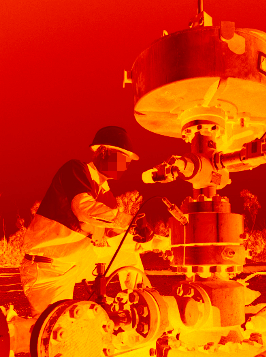Economist knocks gas studies
 Economist Matt Grudnoff says the funding links between fossil fuel firms and researchers could threaten academic independence.
Economist Matt Grudnoff says the funding links between fossil fuel firms and researchers could threaten academic independence.
Funding agreements through the CSIRO have led to another group - the Gas Industry Social and Environmental Research Alliance (GISERA) - being financially and structurally integrated with nominally-independent research groups.
In fact, investigations show that gas industry executives sit on all the committees overseeing research projects, including making up half of the National Research Management Committee.
“Industry-funded research is problematic in situations, where the industry has a lot to gain from a particular outcome,” economist Matt Grudnoff said.
“CSIRO has a long history working with industries to improve innovation or productivity. In such cases all interests are aligned – everyone wants good technology and it either works or it doesn’t.
“GISERA’s social and environmental research is completely different.
“Different stakeholders have different interests. Positive findings will influence regulators and policy makers and could be the difference between the industry getting the green light as it did in Queensland, or being banned like in Victoria and Tasmania,” he said.
“GISERA can wield a lot of influence with 15 million dollars and the trusted CSIRO brand.”
A report compiled by Mr Grudnoff (available in PDF form, here) has found that where the industry will benefit from a predetermined outcome, that outcome is more likely in industry-funded research than in independently-funded research.
In one example, distinct differences were found in the tone of a report on fugitive emissions from coal seam gas (CSG) wells and the tone of a subsequent media article by Professor Damian Barrett, the director of GISERA.
The paper - Field Measurements of Fugitive Emissions from Equipment and Well Casings in Australian Coal Seam Gas Production Facilities - was produced not by GISERA but by another part of the CSIRO.
Professor Barrett and one of the papers authors, who also works for GISERA, wrote about the research findings.
The study itself was important work.
Government estimates of fugitive emissions from unconventional gas including CSG are based largely on measurements of fugitive emissions from conventional gas extraction, but recent studies in the United States have shown far higher rates of fugitive emissions than those found in conventional gas.
As well as making sure Australia’s measurement techniques are as accurate as possible, better measurement of fugitive emissions from CSG might affect the gas industry’s claims that CSG can help reduce Australia’s greenhouse gas emissions.
The study contained a number of limitations – it measured fugitive emissions from just 43 of the 5,000 CSG wells in Australia, and was also limited by the selection of the wells.
The original report acknowledged this.
“Because individual companies agreed to participate in the project at different times during the course of the project it was not possible to make a properly randomised selection of wells at the start of the project,” the report said.
“Instead, wells were selected on an ad hoc basis in the order that companies agreed to participate.”
The gas industry also provided the initial list of wells that could be tested, effectively giving the industry the power to exclude certain wells.
Another limitation was that all the wells sampled were in the production phase, and the report noted that emissions are likely to change over time particularly during periods of repair and maintenance.
The lead author on the paper, Stuart Day – who works for GISERA – and Professor Damian Barrett – the Director of GISERA – wrote about it for The Conversation in an article that had had a different tone and avoided some of the limitations of the research, Mr Grudnoff says.
He criticised the authors for downplaying the size of the measured fugitive emissions.
“On closer scrutiny, some of the leaks were due to faulty seals on equipment and pumps, which could be easily fixed, while other emissions were associated with exhaust from gas-fuelled engines used to power water pumps that are not regarded as ‘fugitive’ emissions,” the article for The Conversation said.
“Someone reading the article could be forgiven for believing that the CSIRO, a trusted organisation, had made an important first step in measuring fugitive emissions from CSG and found them to be smaller than in the US and the report could well be overstating the actual fugitive emissions,” Mr Grudnoff said.
“Indeed the heading of the article ... is incorrect. The paper does not show that CSG emissions are lower in Australia than in the US. There are far too many limitations on the research to make such a claim.”
Mr Grudnoff, an economist for left-leaning ‘progressive’ think tank The Australia Institute said the gas industry should remove itself from all of GISERA’s research committees to decrease the potential for bias.
“While the industry may wish to have close ties with the research program given it has funded the research, these close ties create the perception of bias and call into doubt the independence of the research.
“This is particularly the case given that studies conducted about industry funded research in other industries has shown that it is more likely to make findings that favour its sponsors than independently funded research,” he said.







 Print
Print